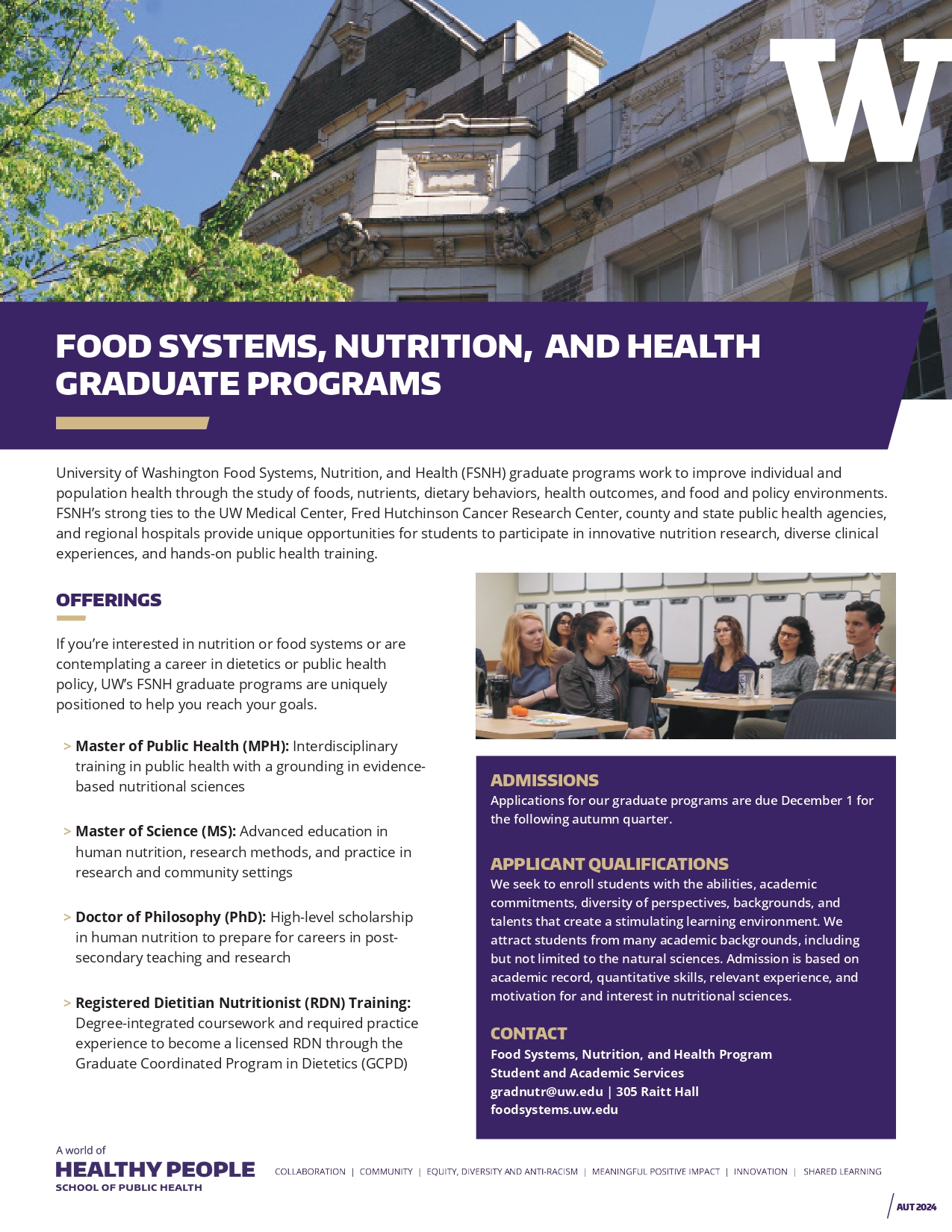- Courses and timing are subject to change.
- Use these tables in conjunction with your official degree audit and guidance from NSP Student and Academic Services.
- MS students must complete a minimum 50 credits.
- GCPD courses satisfy the elective credits required for the MS degree.
- All graduate students complete either a practice-based capstone with mentorship from a faculty instructor and a community partner or a research-based thesis under the direction of a faculty thesis chair and committee. The curriculum above presumes you will be completing NUTR 596 Nutrition Practice Capstone as your culminating experience requirement. Decisions to pursue the capstone or thesis are typically made in winter and spring of year 1.
MS Curriculum
Master of Science (MS) curriculum involves coursework in biostatistics, epidemiology, and nutritional sciences, and culminates in a capstone project or thesis.
If completing the MS with the Graduate Coordinated Program in Dietetics (GCPD; RDN training program), you will take an additional 30 credits RDN practice experience.
Autumn 2024
Course requirements listed on this page apply to students entering the MS program, or the MS and RDN training programs beginning autumn 2024. Refer to the curriculum archives if you entered the program in an earlier year.
Year 1 Autumn (14 credits)
| Course | Name | Credits | Requirement |
|---|---|---|---|
| BIOST 511 | Medical Biometry | 4 | All MS |
| EPI 511 | Introduction to Epidemiology | 4 | All MS |
| NUTR 513 | Food and Society | 2 | All MS |
| NUTR 520 | Nutrition and Metabolism I | 4 | All MS |
Year 1 Winter (9-12 credits)
| Course | Name | Credits | Requirement |
|---|---|---|---|
| HSERV 579 | Structural Racism and Public Health | 1 | All MS |
| NUTR 500 | Food Systems Seminar | 1 | All MS |
| NUTR 512 | United States Food Systems Policy | 3 | All MS |
| NUTR 521 | Nutrition and Metabolism II | 4 | All MS |
| NUTR 536 | Nutrition Education Principles & Practice | 2 | GCPD only |
| NUTR 558 | Foundations of Dietetics | 1 | GCPD only |
Year 1 Spring (10-12 credits)
| Course | Name | Credits | Requirement |
|---|---|---|---|
| NUTR 514 | Sustainable Food Systems for Population Health | 3 | All MS |
| NUTR 526 | Maternal and Pediatric Nutrition | 3 | All MS |
| NUTR 560 | Nutritional Counseling for Chronic Disease | 2 | GCPD only |
| NUTR 562 | Nutrition and Chronic Disease | 4 | All MS |
Year 2 Autumn (7-14 credits)
| Course | Name | Credits | Requirement |
|---|---|---|---|
| NUTR 531 | Public Health Nutrition | 3 | All MS |
| NUTR 559 | Orientation to Clinical Dietetics Practice | 3 | GCPD only |
| NUTR 563 | Nutrition in Acute Care | 4 | GCPD only |
| NUTR 596 | Nutrition Practice Capstone | 4 | All MS |
Year 2 Winter/Spring/Summer – GCPD Only (30 credits)
| Course | Name | Credits | Requirement |
|---|---|---|---|
| NUTR 561 | GCPD Practice Experience | 10 per quarter | GCPD only |
Credits Not Tied to Specific Quarter
| Course | Name | Credits | Requirement |
|---|---|---|---|
| Various | Electives | 10 | All MS |
| NUTR 700 | Master's Thesis | 9 | Optional |
Upon satisfactory completion of the Master of Science in Nutritional Sciences, graduates will be able to:
- Apply knowledge of human nutrient requirements in relation to metabolism, physiology, and pathophysiology across the life course.
- Assess nutritional status of individuals and groups.
- Appraise how nutritional factors across the lifespan are linked to non-communicable diseases (NCD).
- Synthesize human nutrition research for application to health.
- Develop an informed position on a nutrition-related topic.
- Describe how individuals are impacted by US food and public health nutrition systems.
- Recognize the means by which social inequities and racism, generated by power and privilege, undermine nutritional health.
MS students complete either a practice-based capstone with mentorship from a faculty adviser and a community partner or a research-based thesis under the direction of a faculty thesis chair and committee.
See past student projects.



